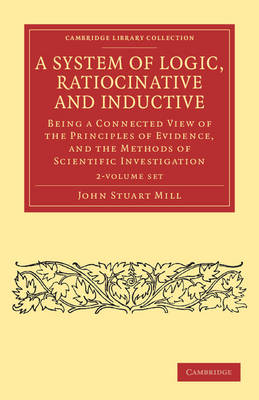Cambridge Library Collection - Philosophy
2 primary works • 6 total works
Volume 1
A System of Logic, Ratiocinative and Inductive: Volume 1
by John Stuart Mill
Published 8 December 2011
This two-volume work, first published in 1843, was John Stuart Mill's first major book. It reinvented the modern study of logic and laid the foundations for his later work in the areas of political economy, women's rights and representative government. In clear, systematic prose, Mill (1806-73) disentangles syllogistic logic from its origins in Aristotle and scholasticism and grounds it instead in processes of inductive reasoning. An important attempt at integrating empiricism within a more general theory of human knowledge, the work constitutes essential reading for anyone seeking a full understanding of Mill's thought. Volume 1 contains Mill's introduction, which elaborates upon his definition of logic as 'not the science of Belief, but the science of Proof, or Evidence'. It also features discussions of the central components of logical reasoning - propositions and syllogisms - in relation to Mill's theories of inductive reasoning and experimental method.
Volume 2
A System of Logic, Ratiocinative and Inductive: Volume 2
by John Stuart Mill
Published 8 December 2011
This two-volume work, first published in 1843, was John Stuart Mill's first major book. It reinvented the modern study of logic and laid the foundations for his later work in the areas of political economy, women's rights and representative government. In clear, systematic prose, Mill (1806-73) disentangles syllogistic logic from its origins in Aristotle and scholasticism and grounds it instead in processes of inductive reasoning. An important attempt at integrating empiricism within a more general theory of human knowledge, the work constitutes essential reading for anyone seeking a full understanding of Mill's thought. Continuing the discussion of induction, Volume 2 concludes with Book VI, 'On the Logic of the Moral Sciences', in which Mill applies empirical reasoning to human behaviour. A crucial early formulation of his thinking regarding free will and necessity, this book establishes the centrality of 'the social science' to Mill's philosophy.
This volume includes the complete essay in five chapters: Introductory; Of the Liberty of Thought and Discussion; Of Individuality, as One of the Elements of Well-being; Of the Limits to the Authority of Society over the Individual; and Applications. With a fine introduction by editor Alburey Castell, this edition also includes line numbers for easy reference, a list of principal dates in the life of John Stuart Mill, and a bibliography.
What is the foundation upon which moral judgments are made? Why and how do we conclude that an action, performed or contemplated, is right or wrong, good or bad? In the eighteenth century, English philosopher Jeremy Bentham developed the now famous moral theory known as utilitarianism, which is based upon the pleasure principle - a concept whose history can be traced back to the ancient Greek philosopher Epicurus and to Hedonism.
In his acclaimed essay Utilitarianism (1863), John Stuart Mill, the intellectual creation of his father (James Mill) and Jeremy Bentham, discusses in considerable detail this powerful and influential principle that grounds the judgment of human action on the extent to which it would result in pleasure or happiness for the greatest number of people. In doing so, Mill not only analyzes objections to the principle of utility, but also distinguishes his own unique interpretation of the principle, thus beginning a self-critical approach to the development and refinement of utilitarian moral theory that remains vigorous to this day.
In his acclaimed essay Utilitarianism (1863), John Stuart Mill, the intellectual creation of his father (James Mill) and Jeremy Bentham, discusses in considerable detail this powerful and influential principle that grounds the judgment of human action on the extent to which it would result in pleasure or happiness for the greatest number of people. In doing so, Mill not only analyzes objections to the principle of utility, but also distinguishes his own unique interpretation of the principle, thus beginning a self-critical approach to the development and refinement of utilitarian moral theory that remains vigorous to this day.
Reissued in its revised 1866 second edition, this work by John Stuart Mill (1806-73) discusses the positivist views of the French philosopher and social scientist Auguste Comte (1798-1857). Comte is regarded as the founder of positivism, the doctrine that all knowledge must derive from sensory experience. The two-part text was originally printed as two articles in the Westminster Review in 1865. Part 1 offers an analysis of Comte's earlier works on positivism in the natural and social sciences, while Part 2 considers its application in areas such as religion and ethics. Mill states that Comte is the first philosopher who has attempted to extend positivism 'to all objects of human knowledge'. Despite being critical of a number of Comte's views, such as the exclusion of psychology from positivist science, Mill acknowledges his fellow philosopher's influence in the face of common negative perceptions of the positivist movement.
A System of Logic, Ratiocinative and Inductive 2 Volume Paperback Set
by John Stuart Mill
Published 8 December 2011
This two-volume work, first published in 1843, was John Stuart Mill's first major book. It reinvented the modern study of logic and laid the foundations for his later work in the areas of political economy, women's rights and representative government. In clear, systematic prose, Mill (1806-73) disentangles syllogistic logic from its origins in Aristotle and scholasticism and grounds it instead in processes of inductive reasoning. An important attempt at integrating empiricism within a more general theory of human knowledge, the work constitutes essential reading for anyone seeking a full understanding of Mill's thought. Volume 1 contains Mill's introduction, which elaborates upon his definition of logic as 'not the science of Belief, but the science of Proof, or Evidence'. It also discusses methods of logical reasoning - propositions and syllogisms. Volume 2 contains 'On the Logic of the Moral Sciences', in which Mills applies empirical reasoning to human behaviour.




